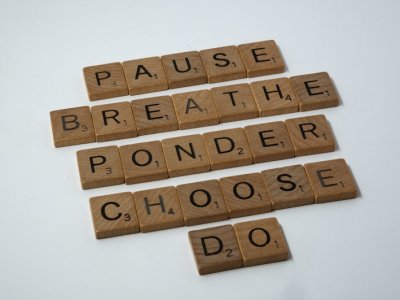Fear of the Unknown – Can’t Stand the Suspense?

photo by Alex Iby
by Andrea M. Darcy
Overwhelmed with anxiety when you think of what lies ahead for yourself, your family, and the world? Or at something like the thought of starting a new job or new school? Is fear of the unknown your problem?
What is fear of the unknown?
The past year has given a perfect example of what fear of the unknown can look like.
In the face of a virus science was still struggling to understand, there was a rise in anxiety, depression and struggles with daily coping.
When we find ourselves panicking in the face of things we feel under informed about, we have a fear of the unknown.
I have information but am still panicking
Feel anxious about something even though you do have information? You might still have a fear of the unknown.
Psychologist R. Nicholas Carleton defines fear of the unknown as the, “propensity to experience fear caused by the perceived absence of information at any level of consciousness or point of processing.”
In other words, if you unconsciously believe you are uninformed, then you might still have a fear of the unknown, no matter how many facts you mentally have.
Take a moment to be quiet and calm and listen to your deeper thoughts and beliefs behind your mind chatter. Do you feel like everything is uncertain? That it’s impossible to know what to do?
Examples of fearing the unknown
Fear of the unknown can manifest in many ways, such as being afraid of:
- new situations like a new school or workplace
- being injured or ill
- boing to new places or going out at all (social anxiety)
- trying new foods
- other cultures and races (racism and xenophobia)
- what lies ahead in your future
- the fate of the world at large
- the futures of your children and loved ones.
The biggest fear of all?
photo by Engin Akyurt
“The oldest and strongest emotion of mankind is fear, and the oldest and strongest kind of fear is fear of the unknown.” H.P. Lovecraft, American writer.
As you can see from the above list, fear of the the unknown hides behind many an anxiety and worry.
Many psychologists see fear of the unknown as what is referred to as a ‘fundamental fear’, a main fear underlying other fears. For example, if we are afraid of going to social events and of travelling, we are actually afraid of the unknown. So they would say that Lovecraft was right.
But we all face unknowns. Why do I get anxiety and others don’t?
Some people suffer a higher level of what psychologists call “intolerance for uncertainty” than others.
Intolerance for uncertainty means you don’t have a strong capacity to endure the feelings triggered by not having enough information and for feeling uncertain. You aren’t naturally resilient.
There can be a genetic component. Some of us seem more sensitive than others. And some of us are naturally more extroverted and confident.
But, as with most mental health issues, there is often a strong ‘environmental’ component to our fear of the unknown. This means that the environments we moved through growing up — our family, extended family, schooling — led to experiences that affected our identity and confidence. This might have been something like constant criticism, neglect, or childhood trauma.
When a phobia of the unknown becomes a mental health issue
Some psychologists argue that fear of the unknown is behind all anxiety and anxiety disorders, including social anxiety, health anxiety, and panic disorder.
An in-depth review or research around fear of the unknown also connected it to:
- addictions and substance abuse
- attachment disorders
- depression
- eating disorders
- obsessive compulsive disorder (OCD)
- personality disorder symptoms.
What can I do if I suffer fear of the unknown?
1. Get informed.
For some people, reading a job description might be enough to apply. But if for you, talking to someone who has already had the job is what makes you feel more at ease, then do so.
Keep avoiding practical information, even though it leaves you stressed? Some of us have a problem with what is called ‘avoidance coping’. Our brain believes it’s taking care of us by avoiding things.
So we can need to bring in support to push ourselves past our built-in resistance to knowing. A common example is avoiding looking at your finances. You might need to hire a coach or financial advisor.
2. Learn how to recognise and differentiate your thoughts.

photo by: Brett Jordan
Fear of the unknown arises from our disordered thinking. And thoughts can be managed and changed.
A good start can be learning to hear your thoughts in the first place (see the below step on mindfulness).
Then learn about the different types of thoughts that can cause anxiety. These include assumptions, core beliefs, and what are called ‘cognitive distortions’, meaning thoughts that seem real but aren’t. Examples include black and white thinking and fortune telling, assuming we know the future.
3. Practice balanced thinking.
Once you are in the habit of tuning in to and challenging your own thinking, you can start to learn what cognitive behavioural therapy (CBT) calls ‘balanced thinking’.
This means finding a thought that is not black or white, but is the most rational and open to possibility.
CBT is based on the idea that by changing our thinking, we change our feelings and actions and avoid falling into depression and anxiety. (Learn its technique for having balanced thoughts here.)
4. Learn mindfulness.
Mindfulness has become very popular of late, chiefly as it works (and research proves it). Many of us lead our lives caught up in analysing the past or worrying about our future. Mindfulness is an easy to learn tool (we teach you how here) that sees you put time aside daily to calm yourself and get centred, then tune in to the here and now.
When we are present, we are more aware of our thoughts and feelings and develop a greater capacity to choose our thinking and responses.
5. Try therapy.
Most therapies are designed to help you gain clarity on yourself, others, and your life, so can help with a fear of the unknown.
Therapies with a strong focus on helping you manage distorted thoughts include:
- cognitive analytical therapy (CAT)
- cognitive behavioural therapy (CBT)
- mentalisation-based therapy (MBT)
- mindfulness-based cognitive therapy (MBCT).
Ready to try therapy for fear of the unknown? We connect you to a roster of highly rated expert London CBT therapists. Or use our booking platform to find UK-wide and online therapists to suit your budget.
 Andrea M. Darcy is a health and wellbeing writer as well as mentor, trained in person-centred counselling and coaching. She often writes about trauma, relationships, and ADHD. Find her on Instagram @am_darcy
Andrea M. Darcy is a health and wellbeing writer as well as mentor, trained in person-centred counselling and coaching. She often writes about trauma, relationships, and ADHD. Find her on Instagram @am_darcy





